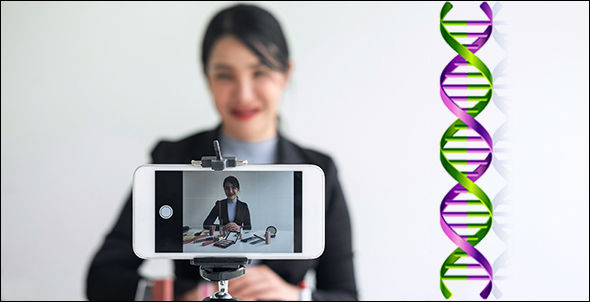On using today’s technology…
Almost as soon as The Legal Genealogist pushed “publish” on yesterday’s blog post, in came The Question.
“The Question” in capital letters because it’s the one that should have been anticipated and answered… and wasn’t.
The blog post was about designating a beneficiary for our DNA test results and any remaining sample, and the particularly urgent need to take care of that chore in these unsettled times. It mentioned the problem of trying to get a beneficiary designation form notarized in this time of social distancing, and suggested handwriting every word of the form rather than using a preprinted form to give the designation the best chance of being recognized as the legally-binding wishes of the test taker.1

The question, from reader Bob S.: “What about recording our wishes in a video format? Wouldn’t that work as well or better?”
Well, yes… and no.
Yes, in the sense that it certainly can make it crystal clear that (a) it’s the test taker — and not somebody else — who’s making the personal choice as to what he or she wants done with his or her DNA test sample and results and (b) the test taker is doing so willingly and without any coercion. There won’t be any issue of identity or handwriting, and a good video will make it clear the test taker is doing this of his or her own free will.
No, in the sense that — as usual — the law hasn’t caught up with technology,2 and a video recording isn’t (at least yet) a substitute for a writing when it comes to something that legally is part of our estate planning.3
Here’s the hitch: in general, wills and other documents affecting estates have to be in writing, and made with certain explicit formalities, in order to be considered valid.
There are two basic exceptions to this general rule. In some jurisdictions, a holographic will — one written entirely by hand by the person making the will4 — may be honored. In others, in very specific circumstances usually limited to military personnel in time of war or those in imminent peril of death, the courts may accept a nuncupative will — essentially an oral declaration in the presence of witnesses.5
None of which will apply everywhere and to everyone right now.
So… would I recommend doing a video?
With the usual caveat that this is not legal advice… Sure.
It can’t possibly hurt, and it might help.
Cite/link to this post: Judy G. Russell, “A follow-up note…,” The Legal Genealogist (https://www.legalgenealogist.com/blog : posted 6 Apr 2020).
SOURCES
- See Judy G. Russell, “DNA in a time of crisis,” The Legal Genealogist, posted 5 Apr 2020 (https://www.legalgenealogist.com/blog : accessed 6 Apr 2020). ↩
- See Dan DeNicuolo, “The Future of Electronic Wills,” Bifocal: A Journal of the ABA Commission on Law and Aging, 15 Oct 2018, American Bar Association (https://www.americanbar.org/ : accessed 6 Apr 2020). ↩
- See generally Mary Randolph, “Can You Make a Video Will?,” Nolo.com (https://www.nolo.com/ : accessed 6 Apr 2020). ↩
- Henry Campbell Black, A Dictionary of Law (St. Paul, Minn. : West, 1891), 576, “holograph.” ↩
- Ibid., 835, “nuncupative will.” See also ibid., 774, “military testament.” ↩



I tested at both FTDNA and Ancestry and named my beneficiary on FT when testing. A friend has both my kit number and password to Ancestry; will this cover me until I get the beneficiary paperwork completed.
It’s probably the best you can do for the moment.
Thank you for the reminder.
As of January, Florida has a new Remote Online Notarization Law. I’m not sure how it works but maybe it would help someone
There are a few states relaxing their notary rules — Texas has as well.
Ref: doing a video of a will signing ceremony: “It can’t possibly hurt, and it might help.” It can help; it can hurt; proceed with caution. I defended successfully on appeal the first trial court order in New York State that had admitted in evidence in the will challenge trial a video of the will signing ceremony. The video had been offered and received in evidence not to prove the terms of the will, which had to be in writing, but rather to show that the maker of the will had sufficient mental capacity to make a valid will. Bear in mind, though, that a video can cut both ways. I seem to recall that there had been decisions in other states reporting that videos had given a jury or a judge reason to conclude that the maker of the will lacked sufficient mental capacity or that the signing ceremony was so tightly controlled that the will was the product of someone else’s undue influence over the maker. Even a video that is made but not to be used at trial may be a problem. Its existence may become known and its production sought by the challenger in pretrial discovery in the expectation that it may show a lack of sufficient mental capacity or the exercise of undue influence – perhaps the very reasons why the decision was made not to use the video.
Considering the context here — signing what’s in effect a codicil limited to DNA test results and sample — by a test taker, alone, my guess is that the downsides are very very very small.